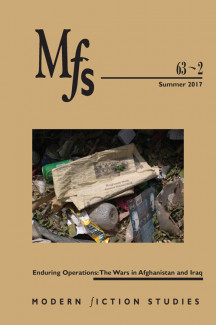
Johns Hopkins UniversityEst. 1876
America’s First Research University
Exploring Consequences

Earlier this year, MFS Modern Fiction Studies released a special issue titled “Enduring Operations: The Wars in Afghanistan and Iraq.” Co-edited by Aaron DeRosa (Cal Poly Pamona) and Stacey Peebles (Centre College), the issue featured eight articles “within a nascent critical engagement with contemporary war narratives,” according to the introduction.
DeRosa and Peebles joined us for a Q&A on the special issue.
How was this special issue conceived and put together?
Nothing good comes out of violence, save maybe art. And art commemorates, it abrogates, and it forces a different kind of awareness of the violence committed by us or upon us.

This project began in response to a sudden expansion of representations of contemporary war, an expansion both of numbers and kinds of representations as well as audiences. In 2012, Chris Kyle’s American Sniper, Ben Fountain’s Billy Lynn’s Long Halftime Walk, and Kevin Powers’ The Yellow Birds were all making headlines, and in 2014, Phil Klay’s Redeployment won the National Book Award. Fountain and Powers in particular tell powerful stories in stylistically innovative ways, but what else is out there? What stories have been told by or about women veterans, by Iraqis? About people living far from a traditional war zone but nonetheless affected by it? From differing vantage points? In film, photography, historical records? We conceived the issue as a way to consider the different voices and valences of war, its variable locations, its new technologies, and its legal and moral justifications.
What did you learn in collecting the papers for this issue?
In short, the strength of the scholarship happening now in this field is rivaled only by its breadth. In this issue, Brenda Sanfilippo writes about literature featuring wounded female soldiers, and Alla Ivanchikova about Afghanistan, war, and deep time. J. D. Schnepf covers domestic drone photography and Patrick Deer both literary and historical loss and recovery related to the Iraq War. That’s just a selection, but it gives a sense of how many ways there are to talk about the impact of contemporary war. In editing this issue, we were both introduced to artistic works and scholarly approaches that were new to us. War is no longer confined to a finite space, and our critical conversations about war are appropriately expanding in turn.
What made MFS the right place for these papers?
Because of the diverse nature of the material we were working with and the kinds of national narratives we were interested in exploring, Modern Fiction Studies stood out as the best venue.
MFS published a special issue in 2011 about fictional responses to 9/11 that was then expanded into an anthology, Narrating 9/11, from JHUP in 2015, and both the issue and the anthology are valuable contributions to the field. We view our special issue as an extension of that contribution, one that thinks through the afterlives of 9/11 in the context of the post-9/11 wars in Iraq and Afghanistan as well as the clandestine drone wars being waged across the Middle East, Northern Africa, and Central and South America.
How difficult is it to put together an issue like this when things change so quickly?
The special issue doesn’t seek to “keep up” with the relevant contemporary texts so much as to take stock of a field that is expanding in deeply productive ways, and to bring scholars who might be working on seemingly quite different materials into awareness of and conversation with each other. “War literature” has traditionally been defined by boots-on-the-ground novels, most often written by men, and while those remain important to consider, there’s so much more out there, as we hope this issue attests. Things are changing quickly, but that’s an advantage to the field as much as it is an editorial challenge.


